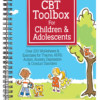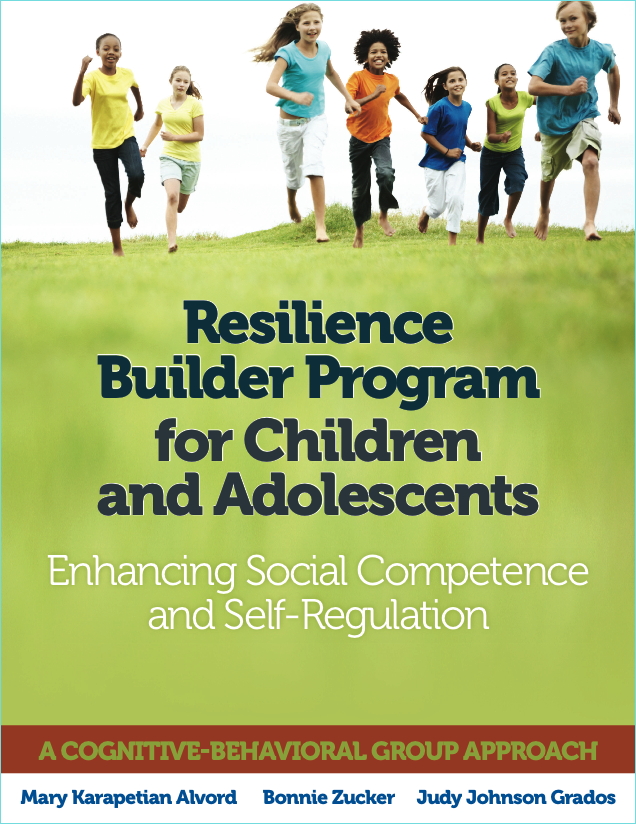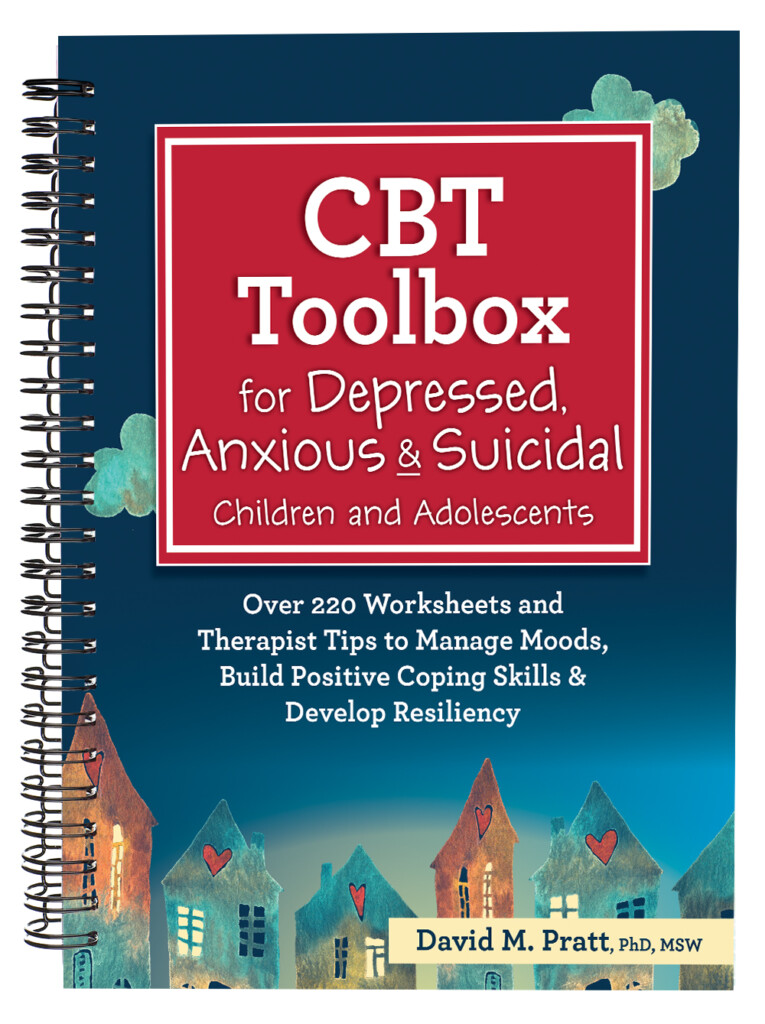The CBT Toolbox for Children and Adolescents was designed with therapists in mind to provide brief, targeted solutions to a myriad of mental health issues that are frequently present in children.
The activities in this workbook enhance traditional CBT by promoting the development of a child’s executive functioning, developing social skills, and prompting a whole brain approach. This book uses a multidisciplinary approach relying on the expertise of school psychologists, social workers, and therapists. Written by clinicians and teachers with decades of experience working with kids, these unique and effective therapy tools are vital to teaching youth how to cope with and overcome their day-to-day struggles.
The workbook covers six clinical areas: Childhood Trauma, ADHD, Autism, Anxiety, Conduct Disorder, and Depression. The activities are tailored to specific disorders and symptomology and can be combined to meet the individual’s needs in regards to interrupting negative thought patterns, developing healthy relationships, and creating mind-body connection.
Within each chapter are four content areas tailored to the specific disorder: Cognitive Skills, Relationship Coaching, Competency Building and Brain-based Learning. This workbook provides activities to address countless symptoms with skill-building exercises.
There are three types of worksheets: In-session Exercise, Client Activity, and Caregiver Worksheet. These handouts have different uses and are written from a different perspective.
Praise
“The CBT Toolbox for Children and Adolescents has CBT activities all in one place. It offers a breadth of CBT exercises that will guide your practice with children who need support to change patterns of thinking or behavior. In addition, the authors have created a comprehensive table of contents to keep you organized and guide your selection of tools for the most common mental health disorders seen in schools and practice today. This is a must-have resource for clinicians who want effective, evidence-based tools at their fingertips.”
—Kristie Reed, LICSW, BCBA, Director, Baird School & INCLUSION Program
“The CBT Toolbox for Children and Adolescents is an excellent resource for any clinician working with children and families. The book covers common challenges seen in children including issues with childhood trauma, ADHD, Autism Spectrum Disorder, Conduct Disorder, Anxiety, and Depression. The structure of the book allows clinicians to easily choose activities that will target particular skill sets and participants (child only, caregiver involvement, and/or therapist involvement). The book provides a comprehensive introduction to each disorder covered and explains how the activities and worksheets will address the respective symptoms or behaviors. The activities and worksheets themselves are very easy to understand and implement, include helpful diagrams/visuals, and can be adapted to each particular child or situation. There is a wide array of activity types to appeal to children with differing strengths and interests. The authors demonstrate a clear expertise in using CBT to address these common challenges seen in children. This is an invaluable tool for clinicians to use with a range of children!”
—Sarah Swenson, PsyD, Sheppard Pratt Health System
Contents
Introduction xi
I. Childhood Trauma
Cognitive Skills
Thinking
Cognitive Behavioral Triangle 2
My Ouch Story 3
Safety Planning 4
Memory
Memory Cloud Walk 5
Memory Land 6
Creating a Schedule 7
Language
Communication Rules 8
This vs. That, Introduction 9
This vs. That 10
Say It Strong 14
Relationship Coaching
Alliance Building
Building a Bridge, Introduction 15
Building a Bridge, Part 1: Present 16
Building a Bridge, Part 2: Past 17
Building a Bridge, Part 3: Collaboration 18
Reciprocal Relationships
Moods and Relationships 19
Relationship Balance, Introduction 20
Relationship Balance 21
Relationship Roadblocks 22
Pro-social Skills
What Do You See? 23
Cycles of Relationships 24
Triggers and Shields, Introduction 25
Triggers and Shields 26
Competency Skills
Resilience
Power Poster, Introduction 27
Power Poster: Part 1 28
Power Poster: Part 2 29
My Positive Thought Journal 30
Symptom Relief
Boo Boos and Bandages 31
Coping Skills 32
Thermometer 33
Emotional Regulation
Feeling Faces 34
Feeling Pie 35
Comfort Levels 36
Brain-Based Learning
Connecting with the Present
Cleaning Up Negative Thoughts 37
Grounding Exercises 38
Balloon Breathing 39
Quieting the Body
Calm Images 40
Calm Down Plan 41
Roll a Brain Break! 42
Mind and Body
Mind and Body Wellness Plan 43
Connecting the Body with Emotions, Introduction 44
Connecting the Body with Emotions 45
Exercise Diary 46
II. Attention Deficit Hyperactivity Disorder
Cognitive Skills
Concentration
Examining Inattention 48
Distraction “To Do” List 49
Times of Inattention 50
Impulse Control
Examining Impulsivity 51
Internal vs. External Distractions 52
Back on Track! Coping with Distractions 53
Creating a Schedule 54
Metacognition
Finding a Solution 54
Thinking About My Warning Signs 55
Reframing Thoughts 56
Relationship Coaching
Alliance Building
Family Rules 57
End on a Good Note 58
All or Nothing and Everything in Between 59
Reciprocal Relationships
Say It or Swallow It 60
Being a Good Friend 61
Staying on Topic, Introduction 62
Staying on Topic 63
Pro-social Skills
Boundaries 64
How Big Is My Problem? 65
Does My Reaction Match My Problem? 66
Competency Skills
Time Management
Estimating Time 67
Goal Setting Worksheet 68
Visualization of Distant Rewards 69
Self-Regulation
Attention Regulator 70
Action Regulator 71
Stop and Think! Managing Impulsivity 72
Memory
Breaking It Down 73
Cues on Cards 74
Cognitive Flexibility, Introduction 75
Cognitive Flexibility 76
Brain-Based Learning
Brain Breaks
Calm Down Bingo, Introduction 77
Calm Down Bingo 78
Animal Break Ladder 79
Whole-Body Games 80
Healthy Habits
Healthy Plate, Introduction 81
Healthy Plate 82
Exercise Routine 83
Time for Bed 84
Positive Mindset
Positive Self-Reflection Log 85
Positive Imagery Practice: In Control
and Focused 86
Look at What I Accomplished! 87
III. Autism Spectrum Disorder
Cognitive Skills
Facilitating Conversation
Allow Me to Introduce Myself,
Introduction 90
Allow Me to Introduce Myself 91
Conversation Map 92
Conversation Toolkit 93
Flexible Thinking
Flexible vs. Rigid Thinking 94
Dealing with Detours 95
Embracing Change 96
Sensory Integration
Sensory Profile 97
Sensory Awareness 98
Sensory Escape 99
Relationship Coaching
Perspective
Perceptive Taking 100
Looking at All Sides 101
Common Ground 102
Emotional Expression
Emotions Cheat Sheet 103
Understanding Emotions 104
What’s My Emotional Temperature? 105
Pro-social Skills
Mindful Communication 106
“I” Statement 101 107
“I” Statements vs. “You” Statements 108
Competency Skills
Managing Expectations
Is it an Emergency? 109
Expected vs. Unexpected 110
Examining Expectations 112
Functional Interactions
My Personal Bubble 113
Control My Volume 114
Appropriate Touching 115
Thought Challenging
Perseveration Log 116
Perseveration Information 117
Perseveration Action Plan, Introduction 118
Perseveration Action Plan 119
Brain-Based Learning
Relaxation
Cool Down Checklist 120
Race Track Breathing: Warm Up or
Cool Down 121
Visual Breathing 122
Social Thinking
How Can I Help? 123
I CAN Make a Choice 125
Reaching Out for Help 126
Brain Games
Emotional Connection Game 127
Find a Friend 128
Conversation Cube 129
IV. Conduct Disorder
Cognitive Skills
Anger
Getting to Know Your Anger 132
Tackling Anger Mountain 133
Weekly Anger Diary 134
Aggression
Times of Acting Out: Introduction 135
Times of Acting Out: Client 136
Times of Acting Out: Caregiver 137
Times of Acting Out: Plan of Action 138
Dysregulation
Going Back in Time 139
Recognizing Emotional Limits 140
Body Reactions 141
Relationship Coaching
Communication
I Feel 142
Watch Your Words 143
Communicating with Others 144
Alliance Building
Understanding Family Rules 145
Friends and Family 146
Respecting Myself and Others 147
Pro-social Skills
Pro-social Behaviors 148
Helpful Behaviors 149
Helpful Self 150
Competency Skills
Sequencing
Behavior Sequencing, Introduction 151
Behavior Sequencing: Part 1 152
Tipping Point: Part 2 153
Behavior Sequencing Redo: Part 3 154
Emotion Regulation
Control Cards 155
Reframing Thoughts 156
Change of Mind 157
Emotional Vocabulary
Building Emotional Vocabulary 158
Linking Emotions, Thoughts, and Feelings 159
Feeling States 160
Brain-Based Learning
Creating Peace
Peace Chain 161
Peaceful Actions 162
Thinking Peace 163
Body Control
Recipe for Success 164
Yell It from the Mountaintop 165
10-Point Check-In 166
Gratitude
Letter of Thanks 167
Little Victories 168
Grateful Feelings 169
V. Anxiety
Cognitive Skills
Defining Anxiety
Getting to Know Your Worry 172
Anxiety Hierarchy, Introduction 173
Anxiety Hierarchy 174
Your Worry 175
Thought Distortion
“Good” Worry vs. “Bad” Worry 176
Detective 177
Weighing Your Worries 178
Physical Reactions/Somatization
Responses, Reactions, and Feelings 179
How Do You Respond to Your Worry? 180
Thoughts and Feelings Log 181
Relationship Coaching
Alliance Building
Talking with Others 182
Helpful Thinking 183
Trust Bubble 184
Assertiveness
Assertiveness Regulator 185
Three Wishes 186
To Do, Won’t Do List 187
Pro-social Skills
Pro-social Behaviors 188
Stressed Out! 189
Fear/Anxiety Self-Statements 190
Competency Skills
Problem Solving
Red Light, Yellow Light, Green Light 191
Creating Your Own Coping Kit 192
Stay Calm Checklist 193
Control
Circle of Control 194
Managing Expectations of Control 195
Controlling Your Thoughts 196
Thought Challenging
What Will Work? 197
How Do We Get There? 198
Stop, Rewind, Rethink, Introduction 199
Stop, Rewind, Rethink 200
Brain-Based Learning
Positive Changes
Within Reach! 201
26 Positive Traits 202
Self-Care Routine 203
Perspective Changing
Staying in the Present, Introduction 204
Staying in the Present 205
Let’s Box It Away 206
You’re Not Alone 207
Brain Games
Relaxation Rolls 208
Mandala 209
Anxiety the Alien, Introduction 210
Anxiety the Alien 211
VI. Depression
Cognitive Skills
Mood
Understanding Your Mood 214
Mood Tracking 215
Building Your Defense, Introduction 216
Building Your Defense 217
Isolation
Social Interaction and Mood 218
People Around Me 219
Support Chain 220
Emotional Expression
My Feelings 221
Uncut Diamond 222
Inside Out 223
Relationship Coaching
Confidence
I Am 224
Your Inner You 225
Self-Portrait 226
Supportive Alliance
Supportive Responses 227
Understanding Stress and Support 228
Support Constellation 229
Self-Esteem
I Like Me! 230
Awards, Introduction 231
Awards 232
I Am Valuable 233
Competency Skills
Realistic Thinking
Reframing Sad Thoughts 234
Optimistic Views 235
Test Your Thinking 236
Coping
Positive Self-Talk, Introduction 237
Positive Self-Talk 238
The Four Questions 239
Coping Skills Tree 240
Problem Solving
Stoplight Problem Solving 241
Finding Another Solution 242
Reaching Out 243
Brain-Based Learning
Fostering Motivation
What Drives You? 244
Positive Goal Setting 245
Self-Improvement Plan 246
Positive Changes
Connecting with Your Body 247
Making Positive Changes 248
Self-Care Plan 249
Healthy Body
Get Moving! 250
Sleep Schedule 251
Emotional Eating 252





